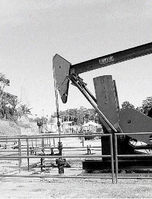Petrotrin battling for survival
Published: Friday | November 13, 2009

Oil equipment at the Petrotrin refinery in Trinidad. - File
Trinidad and Tobago's state-owned integrated energy company Petrotrin is trimming the fat throughout its operation and aiming to become a leaner company to ensure its short-term survival.
Petrotrin President Kenneth Allum said the company, which contributes heavily to the government's coffers, can no longer be regarded as a "sweetbread company".
"We have to face reality and this sweetbread image has to change and we have to face the realities and challenges now facing the company," said Allum, who recently assumed presidency of the company.
He said cost reduction is paramount in ensuring short-term survival, while building the platform for longer-term sustainable growth.
"There are opportunities to reduce cost throughout the organisation," Allum told business leaders recently.
Operational inefficiency
He said areas of process and operational inefficiency currently exist within the organisation. Upstream production must increase for Petrotrin to regain profitability while capital is tied up in ongoing downstream projects.
"Costs must be rationalised where possible, particularly to prevent future cost increases. Long-term returns depend upon investments made in the next five years," he added.
Petrotrin is a major contributor to the country's GDP.
Its revenues for fiscal 2008 were US$6.355 billion.
In 2008, the company also contributed just over US$1 billion to government revenues.
Due to the global collapse in commodity prices, Petrotrin's revenues at the end of August this year were reduced to US$3.128 billion.
Petrotrin has also revitalised its onshore and offshore joint, venture projects.
Five contractors recently signed 10-year sublicence agreements with Petrotrin to explore for oil and gas in eastern fields in Petrotrin's onshore field enhancement programme.
The oil company has both onshore and offshore operations.
Its gross acreage totals 2.53 million while net acreage or net interest in joint venture deals totals 825,080.
Offshore joint ventures
Petrotrin is also partner in 21 onshore and offshore joint ventures in different blocks/fields throughout Trinidad.
Equity share of crude oil and gas production from joint ventures equalled 33.7 per cent of total production for fiscal 2008.
Focusing on the costly Gasolene Optimisation Programme (GOP), which increased from the conceptual cost of US$350 million in 2003 to US$1.3 billion in 2009, Allum said the project is 87 per cent complete and should be fully operational by October 2010.
The GOP was started in 2005 with the aim of modernising ageing equipment, reducing process bottlenecks and tightening product specifications due to environmental trends towards cleaner-burning fuels.
When completed, the GOP will place Petrotrin as one of the premier suppliers of quality, environmentally friendly gasolene in the region.
Positive effects
Benefits of the GOP include an increase in finished gasolene yield of approximately 40 per cent. This is at the expense of unfinished gasolene and vacuum gas oil and purchased isobutanes.
There will also be an improvement of the quality of the gasolene pool in terms of an increase in the Motor Octane Number (MON) and a reduction in the benzene and sulphur content.
There will be an overall improvement in the premium product yield and concurrently a decrease in intermediate refined product yield, improved energy efficiency and environmental compliance and economic maintenance of throughput at 168,000 barrels per day (bpd).
The increase in the cost of the GOP, however, saw Petrotrin going to the international market twice in three years to raise capital.
Last July, the capital-market bonds which were put up for sale on the New York and London markets successfully raised US$850 million.
Earlier in 2006, Petrotrin issued a US$600-million bond to finance the project.
Petrotrin and government officials have blamed the higher prices of materials and equipment and a wider scope of work as among the reasons for the increase in the cost of the upgrade.
Five new plants
The GOP involves the construction of five new plants at the Point-à-Pierre refinery.
There is also a US$392-million ultra low sulphur diesel, or ULSD, plant, which will process cheaper, more sour crude; blend crudes for more stable operation/optimisation; meet new low sulphur diesel specifications and be competitive in international markets; ensure Petrotrin complies with local standards for supply of diesel; and increase refining margin.
According to the government's Supplementary Public Sector Investment Programme 2010, the various GOP projects throughout the years suffered from the global overheated construction industry, which was fuelled by the severe competition for materials, equipment and services from the high- growth areas of China, India, Europe, the Middle East and Latin America, with a number of implications.
No longer prepared
It changed the engineering procurement and construction, or EPC, market and contractors were no longer prepared to bid lump sum prices.
There was also decreased capacity and availability of EPC contractors and consequent escalation in cost of their services.
The cost of services of the project management contractor also escalated, according to the document.
Industry capacity overload resulted in increase in lead time for equipment over a two-year period from 40 to 70 weeks for vessels, from 50 to 84 weeks for compressors and from 40 to 120 weeks for reactors.
Escalation in the cost of materials and equipment varied between 10 per cent and 30 per cent per annum. New items of work also emerged.
business@gleanerjm.com

















